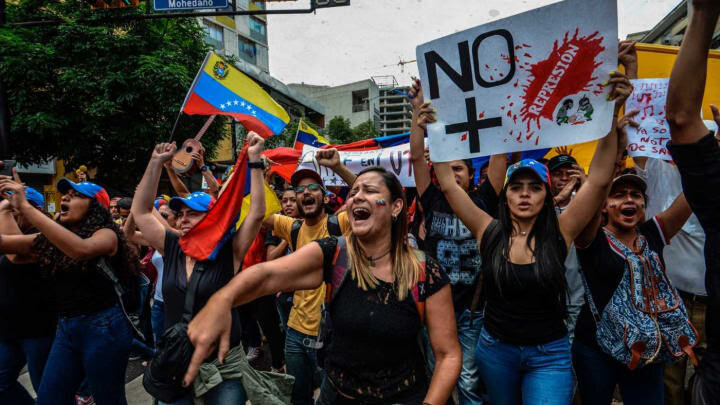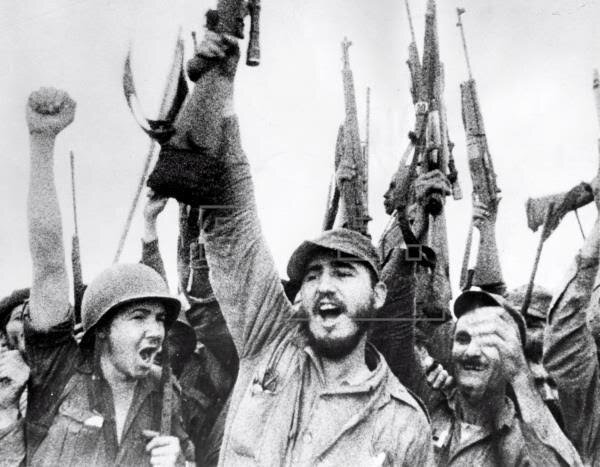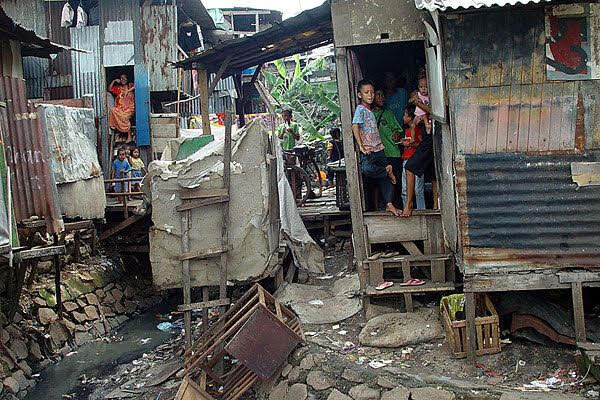Authoritarian Regimes Masked as Socialists:
Venezuela and Cuba
By Ryan Mesa
2014 SOS Riots in Venezuela
As the phrase “SOS Venezuela” enveloped cars, signs, and news outlets during the 2014 protests against the Maduro Regime, Cuban refugees around the world shuddered with empathy as they were witnessing a sight that was far too familiar and painful. The political and economic collapse of Venezuela over the past two decades serves as an eerie allusion to that of Cuba’s during the Castro Regime and ensuing years. In both instances, political and economic reforms which aimed to uplift the lower classes, left the majority of the populations with an inability to afford or even have access to food, clothing, and medical care, among other basic human necessities. As a result, the world witnessed 4.6 million Venezuelans, roughly 16% of the population, flee their homeland since the beginning of the 2014 protests (UNHCR). This number shockingly reflects that of the Syrian refugee crisis, where 4.8 million Syrians were displaced after four years of conflict. Similarly, after the overthrow of Fulgencio Batista by Fidel Castro’s guerrilla fighters in the 1959 Cuban Revolution, approximately 1.4 million Cubans fled to the United States with an additional 300,000 fleeing to other Latin American countries and Europe. Since then, Cuba remains one of the leading countries of immigration to the U.S. (Migration Policy Institute).
How is it then, that Venezuela - once one of the world’s premier producers of petroleum with the largest oil reserve and fastest rising economies - and Cuba - once the outright leader of Caribbean immigration from countries such as Spain, China, Haiti, and Jamaica - face such crippling circumstances to which their populations have been forced to flee? It starts with authoritarian leadership. Upon establishment of the Maduro Regime, a new constitution was implemented as a purging of government jobs coincided. Some changes to the Venezuelan policy were received well, such as judicial reforms which helped curb issues of corruption that previously plagued the country. Other reforms, however, like abolishing the upper house of the Venezuelan Legislation, were blatant acts of power security by the Maduro administration (New York Times). As Dartmouth political scientist John Carey stated it, “He was reducing potential checks on his authority.” Laying the path to this control was Maduro’s predecessor, Hugo Chavez, who had begun the process of limiting his people’s freedoms by revoking the licenses of media outlets, dismantling labor forces and unions upon hearing word of strikes, and replacing judicial figures who tried to challenge his new policies with loyalists. As the Venezuelan crisis worsened under Maduro, he further tightened his grip on Venezuelan rights by arresting opposing political figures and journalists, dismantling websites and news outlets, and even abolishing the powers of the Venezuelan National Assembly (History). These acts of disenfranchisement effectively gave the United Socialist Party of Venezuela control of all three of the government branches (CNN). Similarly, the Castro Regime suppressed the population’s rights to freedom of press, protest, and political opposition. Establishing a new Cuban constitution in 1976, Castro reformed the governmental structure and held all three of the most powerful positions in Cuba’s government: president of the Council of State, President of the Council of Ministers, and first secretary of the Cuban Communist Party (Human Rights Watch). Mass incarceration and harassment of civilians who speak out against political injustices and lack of human rights fostered an environment of fear that has perpetuated generations; forcing an obedience to their country. “Fidel Castro’s Cuba continued to repress virtually all civil and political rights. Castro’s draconian rule and the harsh punishments he meted out to dissidents kept his repressive system rooted firmly in place for decades,” states José Miguel Vivanco, Americas Director at Human Rights Watch.
Fidel Castro after the Cuban Revolution
Upon stripping their citizens of basic rights, political opposition, and judicial checking, outright economic collapse plagued these Marxist countries. The Institute of International Finance estimates that Venezuela has experienced the largest decline in economic output of a country not at war since 1975 while under Maduro’s Regime. From the onset of the recession in 2013 to the end of 2019, Venezuela’s GDP plummeted by an astronomical 62 percent. In 2016 alone, the Venezuelan currency, the Bolivar, became essentially worthless as it was estimated to have inflated by 720 percent. A prime example of fateful interference between the socialist regime and the Venezuelan economy was seen with the nation’s top private oil company, which was nationalized in 1976 and renamed Petróleos de Venezuela, or PDVSA. After coming under state rule, PDVSA workers initiated a union strike which resulted in the firing of 18,000 skilled employees, only to be replaced by 100,000 Chavez loyalists. The operating budget of the once global leading oil manufacturer had been diverted to fund ‘welfare’ programs initiated by Chavez which in turn were used to pay off political allies and promised subsidies for affordable food. Despite the global boom experienced by the oil industry, PDVSA’s production dropped as injury rate and man-hours increased. The negligent trend continued through to Maduro’s administration as $500 million from a PDVSA pension fund was used in a government run pyramid scheme (New York Times). PDVSA is just one example of the plethora of businesses who would find themselves tanked by the corrupt Venezuelan government. An economy solely dependent on the oil industry, Venezuela now found itself with no source of income to fund its subsidies and welfare programs. In response to this predicament, Maduro printed more money, driving inflation while implementing price controls and fixing currency exchange rates. These actions caused basic goods and imports to become unaffordable for the Venezuelan population. As a result, businesses continued to shut down and the cycle of inflation was perpetuated by Maduro. Eventually, basic necessities such as food, clothing, and water find themselves in shortage while Maduro continues making false promises of handouts and further welfare (New York Times). In similar fashion, Fidel Castro’s first orders of business included modernizing the country’s electrical infrastructure, providing free education and healthcare, and creating full employment under Cuba’s communist state (History). In order to fund these hopeful advancements, all private businesses within Cuba became nationalized. By 1993, Cuba’s GDP had retracted 35 percent while imports dropped 78 percent. To demonstrate the stagnation of the Cuban economy since the Communist revolution, Cuba’s GDP per capita in 1959 was $2,067 a year, comparable to those of Ecuador (1,975), Jamaica (2,541), Panama (2,322), and Puerto Rico (3,239) (Forbes). In the 40 years that passed since the takeover, Cuba’s GDP per capita crept up a mere $240 to become $2,307. Contrast this growth to that of the aforementioned countries of Ecuador (3,809), Jamaica (3,670), Panama (5,618), and Puerto Rico (13,738), and the impairment caused by the communist Castro Regime is undeniable. While GDP isn’t an all telling determinant of the status of a population, it does represent what the average civilian is able to consume and afford.
Mass emigration and economic ruin ensued these detrimental economic and political reforms, leaving shells of their former countries. In Venezuela, a majority of their 32 million inhabitants can no longer afford food or proper medical care, as malnutrition is widespread. Common household goods such as toilet paper and soaps are not even attainable at times due to national shortages. Within the healthcare system, basic medical necessities such as medications, electricity, and clean water are scarce in supply (History). Due to the shortage of water and gasoline, the country is frequented with power outages that inhibit entire cities from accessing bank or cell services, amongst other basic utilities, for days on end. One specific blackout during March 2020 in Venezuela’s capital, Maracaibo, left the entire city without power for a week. The chaos that ensued included over 500 businesses that were looted and ransacked. The murder rate in Venezuela, last reported in 2014, was equivalent to that of Iraq’s in 2004 (New York Times). In Cuba, the fleeing of businesspersons, professionals, and skilled workers from the upper and middle classes led to an absolute brain drain of the workforce. Today, the average income in Cuba is $20 a month. When comparing this number to the cost of goods such as a restaurant meal that costs $5, or toilet paper that costs $4, it is evident the population is confined to poverty (National Review). Many Cubans are forced to live together in order to afford rent by combining salaries. In most cases where renovations and repairs are needed for their deteriorating homes, tenants must save for months or years on end to afford something as ordinary as a $40 roof repair.
Poverty in Cuba
For Venezuela, the drop of its share in the oil industry in combination with massive spending on social programs by Chavez and Maduro, in addition to U.S. sanctions and overall corruption, has caused the once-rich nation to experience absolute economic collapse. Having already inherited a downward trending economy, Maduro had to make the decision to drastically cut welfare spending or to run the country into an insurmountable deficit. Choosing the latter, Venezuela now finds itself as the number one exporter of refugees with a historical economic demise. As for Cuba, the remnants of what the country once was are frozen in time, evident by the classical cars, kitchen appliances dating back the USSR era, and its crumbling infrastructure. As stated by Scott Beyer, writer for The National Review, “Cuba has at least remained true to its roots, imposing, for more than half a century, a juvenile notion of egalitarianism on the masses. Rather than uplifting them, this has reinforced the lowest common denominator: Everyone is poor.”
Works Cited
Kurmanaev, A. (2019, May 17). Venezuela's Collapse Is the Worst Outside of War in Decades, Economists Say. Retrieved from https://www.nytimes.com/2019/05/17/world/americas/venezuela-economy.html
Fisher, M., & Taub, A. (2017, May 14). How Venezuela Stumbled to the Brink of Collapse. Retrieved November 13, 2020, from https://www.nytimes.com/2017/05/14/world/americas/venezuela-collapse-analysis-interpreter.html
Kiger, P. (2019, May 09). How Venezuela Fell From the Richest Country in South America into Crisis. Retrieved November 13, 2020, from https://www.history.com/news/venezuela-chavez-maduro-crisis
Blakemore, E. (2018, April 18). How the Castro Family Dominated Cuba for Nearly 60 Years. Retrieved November 13, 2020, from https://www.history.com/news/cuba-after-castro-miguel-diaz-canel
Worstall, T. (2016, November 26). Fidel Castro's Economic Disaster In Cuba. Retrieved November 13, 2020, from https://www.forbes.com/sites/timworstall/2016/11/26/fidel-castros-economic-disaster-in-cuba/?sh=378ba95e6b65
Duany, J. (2020, October 21). Cuban Migration: A Postrevolution Exodus Ebbs and Flows. Retrieved November 13, 2020, from https://www.migrationpolicy.org/article/cuban-migration-postrevolution-exodus-ebbs-and-flows
Cuba: Fidel Castro's Record of Repression. (2020, October 28). Retrieved November 13, 2020, from https://www.hrw.org/news/2016/11/26/cuba-fidel-castros-record-repression
Beyer, S. (2015, November 02). A Look at How Cuba's Working Class Lives. Retrieved November 13, 2020, from https://www.nationalreview.com/2015/10/cuba-working-class-communism-castros-poverty/
Curry-Machado, J. (2005, June). SURVIVING THE ‘WAKING NIGHTMARE’: SECURING STABILITY IN THE FACE OF CRISIS IN CUBA (1989-2004) [Scholarly project]. In Crisis States Research Centre. Retrieved November 12, 2020, from https://www.lse.ac.uk/international-development/conflict-and-civil-society/past-programmes/crisis-states-network




